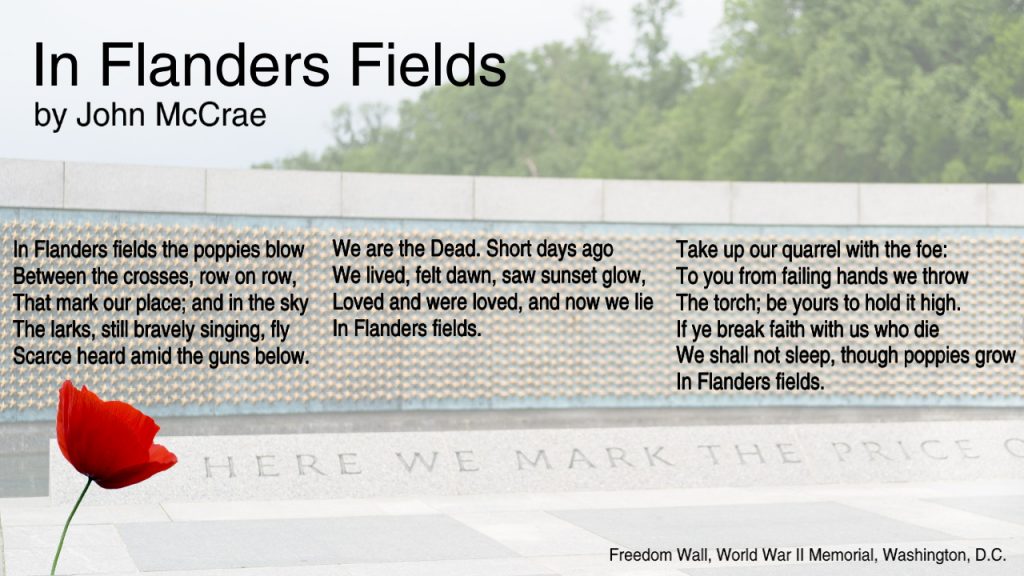“Originally, Memorial Day was known as Decoration Day, meant to honor the Union and the Confederate soldiers who died during the American Civil War. By the 1900s it had become a day to celebrate all American soldiers who died while serving in the military. It wasn't until 1967 that it was legally named Memorial Day.” (Source: https://www.softschools.com/facts/holidays/memorial_day_facts/158/)
When I served in the US Army, my first official army Memorial Day was as a duty officer in 1967 in Ludwigsburg Kasern, near Stuttgart. This was a somber time. The NATO-Warsaw Pact tension was high, and a shooting war in Southeast Asia was getting hotter, with its epicenter in Vietnam.
The world is quite different now. In our battle against COVID-19, the United States has experienced more casualties in a few months than it did over the course of the entire Vietnam War. The frontline soldiers today include insufficiently equipped healthcare workers. And German and European vaccine research is fully partnered with American firms and universities to confront and subdue a microscopic enemy.
The human spirit, in these times as in those, remains unvanquished. Frontline scenes in hospitals, first responders who keep responding despite risk, and nurses’ faces deeply marked by masks worn on long shifts are all emblematic of heroic courage, caring, and sacrifice. The smiling photos of healthcare workers whose faces are obscured by PPE reflect our insistence on remaining fully human to one another, despite COVID-19.
Also emblematic of the times are delightful and moving musical performances pieced together over great distances to become one. We have shared some of the best of these. But the truth of the hour is that, however we manage to come together, a virus has robbed us of many things, like attending a Memorial Day ceremony or playing music together in the same room or being one among many in an inspired audience, joining in applause.
We adapt and learn to be together and alone on different terms. Imagine a musician playing alone in a deserted airport that echoes with emptiness. Just one performer. Now imagine an audience, but not in the sense that we have known audiences or been a part of them – just a single person in a single chair. A performance of one for an audience of one. In the Stuttgart airport, this singular experience is happening, and it transforms and intensifies the communication that music affords, for both the performer and the listener sitting in the chair. See, for an account, “Solo for Flute, Airport Terminal and One Listener,” https://www.nytimes.com/2020/05/13/arts/music/stuttgart-airport-coronavirus-concert.html?referringSource=articleShare. Be sure to watch, embedded within the article, the video of a 3-minute solo performed by flutist Stephanie Winkler for listener Annika Fink.
For more information (in German) about these extraordinary concerts, see “1:1 Concerts – Das Konzertformat im Frühjahr 2020!” https://www.staatsoper-stuttgart.de/spielplan/1to1/?referringSource=articleShare.
Please be safe and careful during this Memorial Day weekend.
David R. Kotok
Chairman and Chief Investment Officer
Email | Bio
Links to other websites or electronic media controlled or offered by Third-Parties (non-affiliates of Cumberland Advisors) are provided only as a reference and courtesy to our users. Cumberland Advisors has no control over such websites, does not recommend or endorse any opinions, ideas, products, information, or content of such sites, and makes no warranties as to the accuracy, completeness, reliability or suitability of their content. Cumberland Advisors hereby disclaims liability for any information, materials, products or services posted or offered at any of the Third-Party websites. The Third-Party may have a privacy and/or security policy different from that of Cumberland Advisors. Therefore, please refer to the specific privacy and security policies of the Third-Party when accessing their websites.
Sign up for our FREE Cumberland Market Commentaries
Cumberland Advisors Market Commentaries offer insights and analysis on upcoming, important economic issues that potentially impact global financial markets. Our team shares their thinking on global economic developments, market news and other factors that often influence investment opportunities and strategies.


